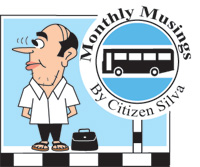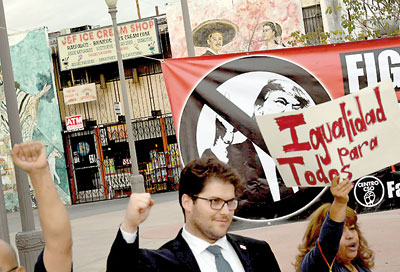Sunday Times 2
Remembering the people
View(s):Many folk all over the world have been trying to explain the extraordinary and unexpected success of Donald Trump. A brash builder and property developer with no previous experience of either political or military service, he has been elected as the political leader and military commander of the most powerful nation on earth.

While others who are cleverer than I am and wiser to the ways of the American political scene will continue to debate, refine and trump out their various theories, I have in this small corner of the planet (half a world away from Washington DC) spent some time musing about this manâs confounding election victory.
On November 8th last year about 63 million Americans (approximately 27% of those who were eligible to vote) cast their ballots in favour of this man – and elevated him to the office of president. My theory is that these folk felt so angry and so abandoned by the established system that they were prepared to vote for anyone who promised to tear it down.
âBut,â protested the establishment, âDonald Trump is an uncouth, vulgar, sexist, racist, impulsive, dishonest and academically challenged billionaire whose only claims to fame are that he had his own TV show, shoots his mouth off – and now has a Twitter account with several million followers!â
And the voters simply responded âSo what?â
It is not that they were in agreement with all the ludicrous stuff he tweeted and shouted out from election platforms, putting his mouth into operation before he had put his brain into gear. It is not that they approved of his disrespectful treatment and crude references to women. It was simply that they just didnât care. They didnât vote for him because he insulted women or Mexicans or Muslims or war heroes, they voted for him in spite of this.
These people, armed with nothing more than their vote, were so fed up with the established politicians who had been governing their country all this time that they couldnât care less who they voted in – as long as it was an outsider who had what it took to overturn the established system which they had come to believe was just âGovernment of the politicians, by the politicians, for the politicians.â

Anti-Trump protesters. AFP
Democratic regimes cannot survive for long without delivering real economic progress to the population. After all, what does democracy, what does reconciliation, what does âgovernment of the peopleâ and a new constitution mean to the man and woman in the street if they do not see tangible results?
If to these people democracy means nothing more than having to stand in line outside a voting booth every so many years, waiting to mark a piece of paper and get their little finger inked, without them receiving any improvements in their living standards, is it surprising that they get frustrated with their elected leaders?
In our own country, political power comes from politicking â candidates advertising themselves through posters and papers, selling themselves from platforms at election time, aiming to convince us gullible voters of what they will do if elected into office.
Now it must be noted that (contrary to what is often reported) these candidates are elected into office, not elected into power â but once in office, those elected lose little time in consolidating their power.
Such power brings with it privilege and privilege can be used to acquire resources â which resources are then used to retain power. In the unlikely event that a candidate is voted out of office, the resources and privileges that were acquired during the years in power are then utilised to regain power.
In Sri Lanka, even if we manage to vote politicians out of office, the power they have acquired during their time in office and the influence they wield as a result of having been in power, allow them to get back into office through the back door of nomination â by other politicians in higher positions who need their political support.
It was the former Singapore leader Lee Kuan Yew who wisely observed in his book One Manâs View of the World âWhat is lost in the rough and tumble, in the horse-trading and inducements of modern politics, is the people.â
And I cannot help musing how in Sri Lanka too, politicians remain in power as a result of horse-trading and inducements. âI will give you a ministry (or a diplomatic post or a directorship in a corporation)â the leader promises, as if these perks belong to him and are his by right to bestow on others, âif you will support me and not my rival in my quest to remain the supreme leaderâ.
And it matters not a jot if the potential supporter being so wooed is uncouth, vulgar, racist, academically challenged, dishonest or the owner of assets far in excess of what an honest man could have earned through legitimate toil and labour. What matters is that this person can provide support where it matters to the supreme leader â and help the supreme leader stave off challenges to his position from rivals.
Lee Kuan Yew was right.
With all the horse-trading and the inducements, all the ministerial and gubernatorial posts traded off for political support, we the people have been lost and forgotten.

